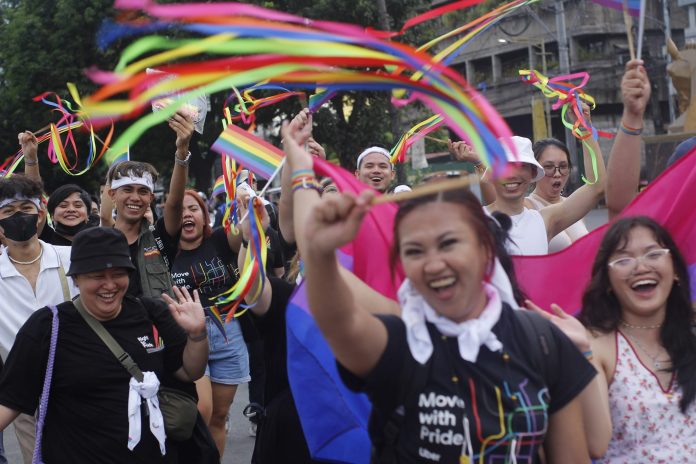I first saw the film “Ang Pagdadalaga ni Maximo Oliveros” in 2005 when it premiered at the First Cinemalaya Film Festival of the Cultural Center of the Philippines (CCP).
Set in the slums of Manila, the coming-of-age comedy-drama film is about a gay teen (Nathan Lopez) who is torn between his love for a young cop (JR Valentin) and his loyalty to his family.
Directed by fellow UP alumnus Aureaus Solito, I saw it again during last week’s CCP Cinema Under the Stars (CUTS) in celebration of Pride Month, along with two short films “Pasilong” and “Geegee and Waterina”. The latter is about a comfort gay.
The film was the official entry of the Philippines to the 79th Academy Awards. It has been included in various lists of best films on lesbian, gay, bisexual, transgender, queer, questioning, intersex, and asexual (LGBTQIA+).
Pride Month every June commemorates the 1969 Stonewall riots in Manhattan, New York, where LGBTQIA+ individuals protested against police harassment and persecution commonly experienced by the community.
Rainbow flags were raised as thousands of members of the LGBTQIA+ community, advocates, and allies marched for justice and freedom during the simultaneous pride festivals in Quezon City and Makati City last Saturday, June 24.
The “Love Laban” Pride Festival was held at the Quezon Memorial Circle in Quezon City, while the “Tayo Ang Kulayaan: Pride March and Festival” was conducted at the Circuit Events Grounds in Makati City. There are other events in other parts of the country serving as the culminating event of the month-long celebration of Pride Month.
In a message delivered in Makati, Gabriela Women’s Partylist Rep. Arlene Brosas vowed to continue pushing for the passage of the sexual orientation, gender identity, gender expression, and sex characteristics (SOGIESC) Equality Bill.
“Its passage is long overdue. Every person, regardless of their sexual orientation, gender identity, or expression, deserves the same rights and opportunities as everyone else,” Brosas said. The bill was first filed in 2000 by then-Senator Miriam Defensor-Santiago.
The bill lists the practices to be considered discriminatory and unlawful, which include the denial of rights to the LGBTQIA+ community on the basis of their SOGIE, such as their right to access public services, right to use establishments and services including housing, and the right to apply for a professional license, among others.
The bill also deems as discriminatory the differential treatment of an employee or anyone engaged in rendering services, denial of admission to or expulsion from an educational institution, and refusal or revocation of accreditation to any organization due to an individual’s SOGIE.
The act of forcing any person to undertake any medical or psychological examination to alter his SOGIE, the publication of information intending to “out” a person without his or her consent, public speech meant to vilify LGBTQIA+, the harassment, and coercion of the latter by anyone especially those involved in law enforcement, and gender profiling will also be penalized.
“LGBT discrimination has a long history and serves as a remnant of the colonial era when the most powerful nations used laws as mechanisms of control over morality and standards of behavior,” says the Supreme Court in the case of Jesus Falcis III v. Civil Registrar General (GR 217910. September 03, 2019).
Penned by my UP Law professor and SC Senior Associate Justice Marvic Leonen, he stressed that the SC is “not blind to the fact that, through the years, homosexual conduct, and perhaps homosexuals themselves, have borne the brunt of societal disapproval. It is not difficult to imagine the reasons behind this censure — religious beliefs, convictions about the preservation of marriage, family, and procreation, even dislike or distrust of homosexuals themselves and their perceived lifestyle”.
Falcis had requested that the SC declare unconstitutional on equality grounds certain provisions of the Philippine Family Code that define marriage as a union between a man and a woman.
Justice Leonen added that the SC “understands the desire of same-sex couples to seek, not (a) moral judgment based on discrimination from any of our laws, but rather, a balanced recognition of their true, authentic, and responsive choices.”
However, the SC dismissed the petition since granting it would cause the SC to arrogate to itself quasi-legislative powers as statutes would have to be changed to accommodate his petition.
The SC stressed that the request was too limited in scope, as there are a wide variety of other statutes besides the Family Code that similarly treat marriage as a heterosexual institution.
Leonen stressed that it is within the wisdom of Congress “to act with dispatch in addressing the suffering of many of those who choose to love distinctively, uniquely, but no less genuinely and passionately.”
Atty. Dennis R. Gorecho heads the seafarers’ division of the Sapalo Velez Bundang Bulilan law offices. For comments, e-mail [email protected], or call 09175025808 or 09088665786









